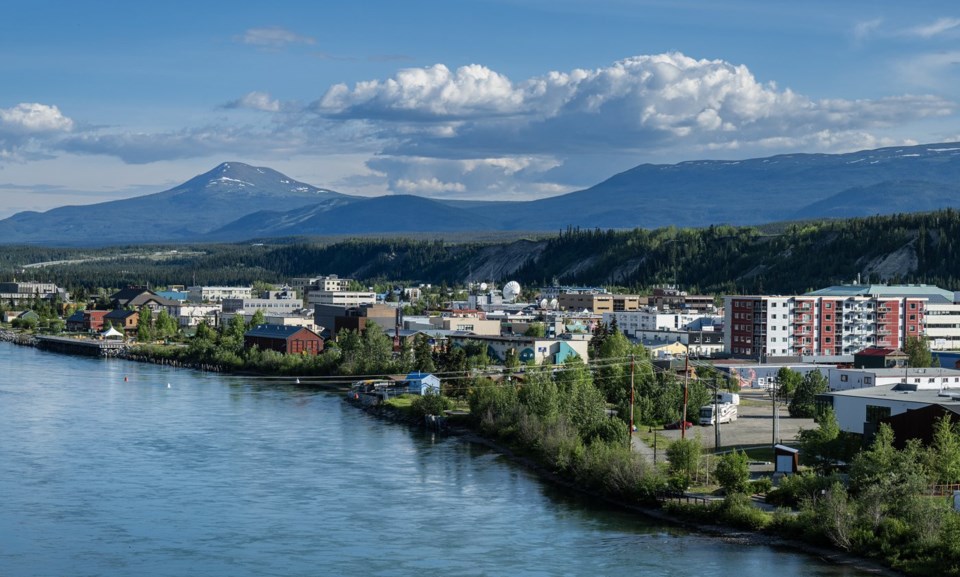The City of Whitehorse denies its snow removal policies make transit stops and parking inaccessible for people with disabilities, defending itself against claims made in a lawsuit by pointing out its snow removal budget is limited with "scarce resources."
The city filed a statement of defence in a proposed class-action lawsuit launched in September on behalf of people with disabilities who allege the city's failure to remove snow and ice at bus stops and around accessible parking spots make them "second-tier" citizens.
The lawsuit filed in the Supreme Court of Yukon alleges the city's snow and ice policy "fails to consider that individuals with disabilities have unique mobility concerns."
The plaintiffs claim their mobility is restricted when snow is piled up around accessible parking spaces, sometimes for weeks on end, leading to an "exclusionary state of affairs" in the city.
They claim roads and sidewalks often accumulate "dangerous and excessive" amounts of ice and snow, and class members' mobility is restricted to the point of impacting their "dignity and quality of life."
The plaintiffs claim the city's "policies, bylaws, operations, decisions, and actions surrounding snow and ice removal, barrier-free accessible parking spaces and city transit stops create a distinctive and discriminatory effect on disabled individuals who reside in Whitehorse."
The statement of claim was filed by lead plaintiffs Ramesh Ferris, whose legs are paralyzed due to contracting polio as a child, and Eva von Flotow, who requires a wheelchair due to quadriplegic cerebral palsy.
Ferris alleges in the case that some transit stops lack benches, forcing him to stand, "which is unsafe and physically impossible for him to do."
He claims the stops without benches are worse in the winter because they're "rarely cleared of snow or ice."
Ferris also claims he's slipped between 10 and 15 times trying to use an accessible parking stall in town, and sometimes he decides to stay home rather than face the "risks and dangers" of venturing out.
Von Flotow's experiences detailed in the lawsuit outline how she's unable to use the city's Handi Bus system because its policies require her to be picked up nearly 200 metres from her home.
She claims she's forced to turn her wheelchair around when downtown in the snow when businesses fail to clear sidewalks, one of the many "barriers" she alleges prevent her "from doing what she needs and wants to do."
"Such barriers cause stress, anger, shame, humiliation and disappointment and cause Ms. Von Flotow to feel like a second-class citizen of Whitehorse," the lawsuit says. "Sometimes Ms. Von Flotow does not even want to leave her house, as it is too hard to go downtown and move around."
Their lawsuit seeks to represent Whitehorse residents who live with legal blindness or conditions that limit their mobility that would make them eligible for a City of Whitehorse accessible parking permit, whether they have one or not.
The city filed its defence to the lawsuit on Oct. 28, denying the class members' allegations.
"The city operates with a limited snow removal budget, which is subject to the scarce resources of the city," the defence statement said.
The city claims its snow and ice control policy provides "the greatest benefit to the majority of the travelling public using the limited budget."
The statement of defence says territorial law allows people to challenge a bylaw if its "discriminatory," but "only if it operates unfairly and unequally between different classes of persons without reasonable justification."
Whitehorse also denies that transit stops are inaccessible "as alleged or at all," and claims its Handi Bus offers door-to-door services to people who have difficulty accessing regular buses.
The city's defence denies breaching class members' Charter rights, and also claims the lawsuit was filed improperly to "circumvent" a territorial law that "limits the ability of individuals to bring actions against the city."
It also claims the proposed class is "too broad."
Meriya Gmeiner-McPherson, advocacy manager with Inclusion Yukon, said the issues raised in the lawsuit are not new.
"So many residents of Whitehorse have been talking about this for decades," she said. "This has been something that many residents have experienced, the challenge of navigating their community for years."
Inclusion Yukon isn't involved in the case, she said, but they're "incredibly supportive of the plaintiffs" because they're representing people who are often overlooked and trying to ensure Whitehorse is "accessible to all people."
Vincent Larochelle, the plaintiffs' lawyer, did not immediately respond to a request for comment.
The City of Whitehorse said it does not comment on legal matters, and its lawyer did not immediately respond to a request for comment on the lawsuit and its statement of defence.
This report by The Canadian Press was first published Nov. 3, 2024.
Darryl Greer, The Canadian Press



